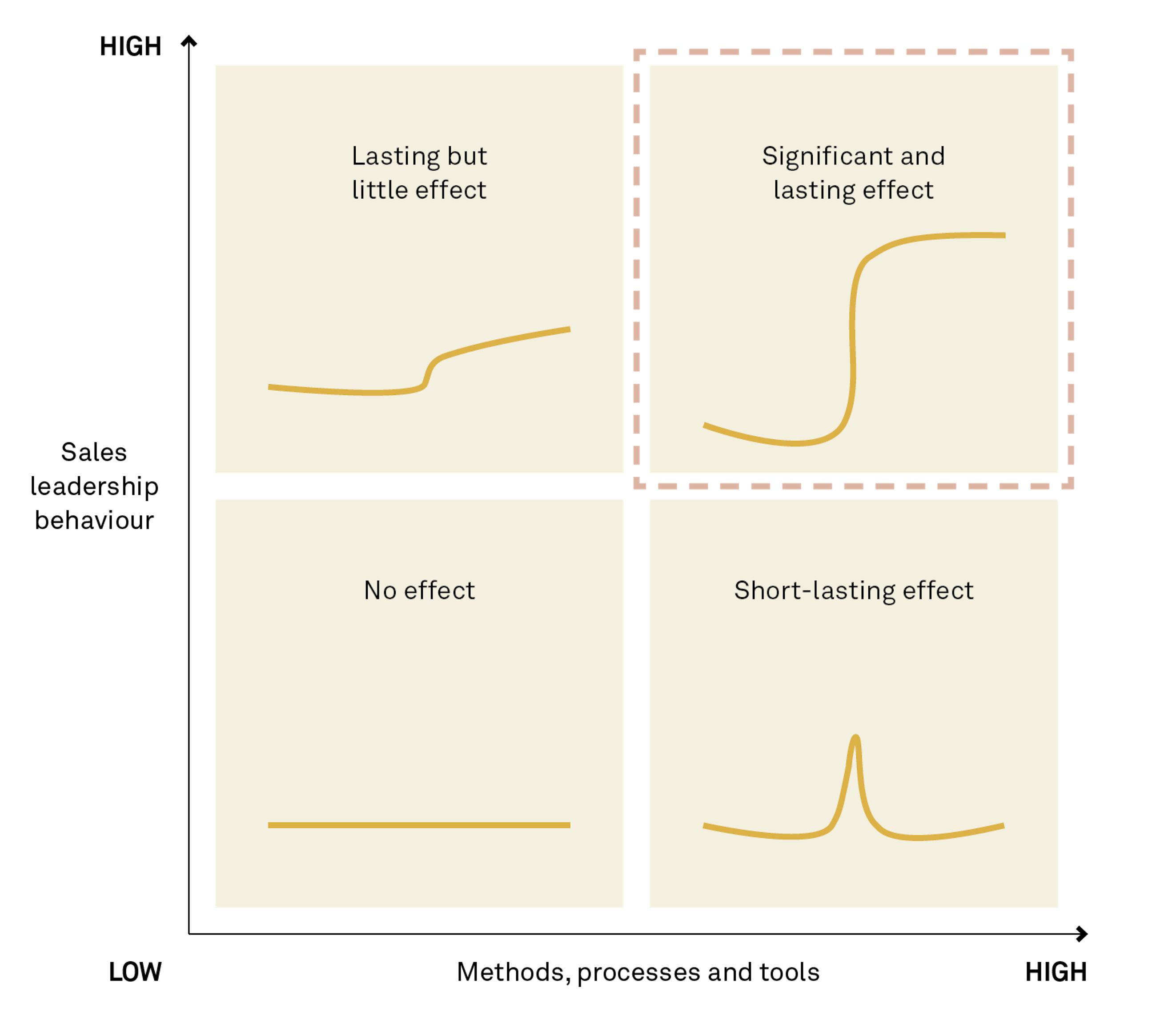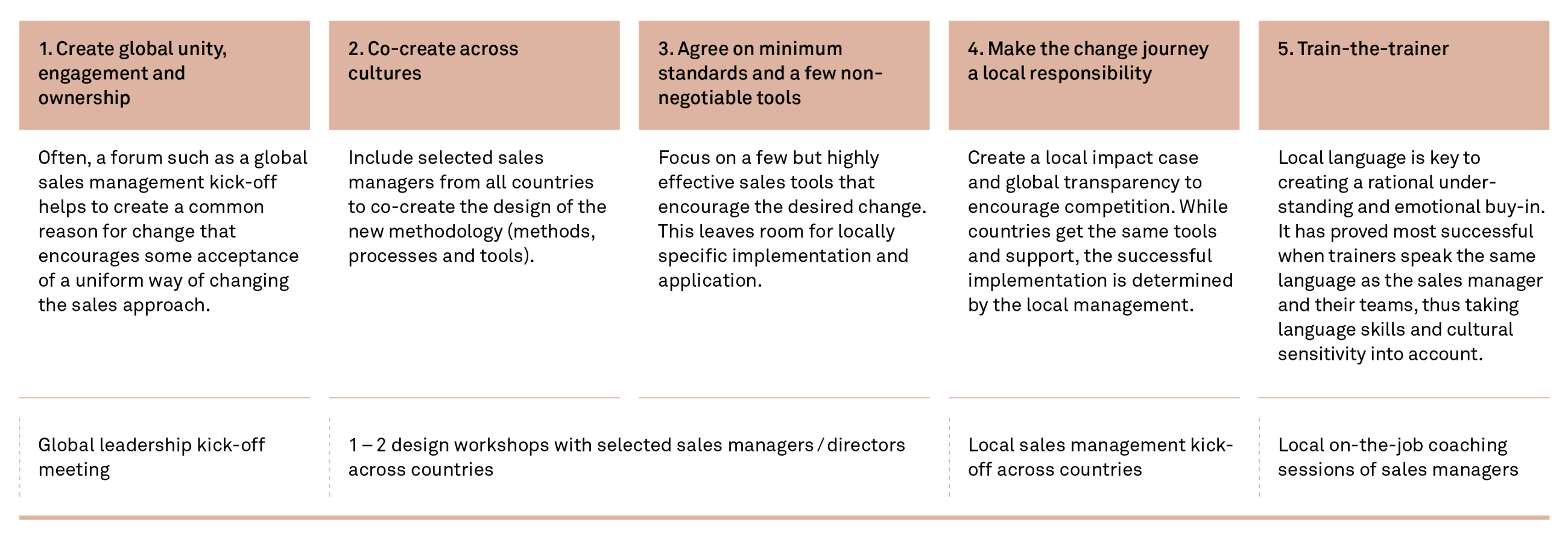– Two key elements in creating significant and lasting global change
7 June 2018
"We need to change the way we sell and create more value in our customer interactions."
An important prerequisite for this ambition, at least if we are talking about multinational companies, is a global harmonisation of sales processes and behaviour. This again requires lasting behavioural changes in the entire global sales organisation. Here the key levers, in our experience, are engagement of local sales managers and development of their coaching capabilities.
Experience from numerous projects supporting companies in changing the way they sell has taught us that there are two crucial elements in creating sustainable change in sales organisations.
- There must be certain processes and tools in place that facilitate and encourage the desired behaviour.
- Local sales managers must adjust the conversations they have with their sales people so that they reflect the conversations they encourage them to have with their customers – change happens through changing conversations.
1. Implementing a global sales methodology – “one size fits all” does not really fit anyone
When you implement a new sales methodology, i.e. sales methods, processes and tools, it is tempting to apply a well-proven, standard “one size fits all” solution. And while there certainly are advantages to this approach, there are also some issues we must consider.
One issue we often encounter is the “not invented here syndrome” where local management and employees feel that they have not been involved in decisions that concern their daily work. Comments such as “it is just another headquarter initiative”, “it is created in the ivory tower”, “not practicable” or “even created by consultants not knowing the business” show that there has been little interest, respect and consideration for local differences in the company’s change management.
To avoid this resistance in a transformation process, it has proved very successful to involve local sales management very early in the change journey. Actually, already in the design phase, which is usually reserved for top management and global sales excellence functions.
Moreover, it is crucial to align across countries on key best practice behaviour and tools that are relevant for each country to aim for. Finally, while the enablement of sales people and sales managers needs to be a local responsibility, it must be supported globally with local language resources, if needed.
We suggest considering five checkpoints along the global change transformation.
2. Changing sales leadership behaviour – coaching in different cultures
We know from research and experience that it takes at least 24 positive experiences to turn a new behaviour into a habit. A key question in this specific context is how sales managers can support sales reps in adopting the new sales behaviour and, not least, how they motivate them to continue to work differently.
There is a vast amount of theory on the benefits of leadership coaching. Motivation, higher goal attainment and reduced churn are just some of them.
In a sales context, research has shown that 42% of sales manager effectiveness is due to coaching activities with the sales reps (CEB). While we know that sales coaching is very effective in skills development and changing the behaviour of sales people, its success is also dependent on the relationship between sales manager and sales rep, which is shaped by the cultural context. We have found four design criteria to be useful when upskilling managers of different cultures in their sales coaching.
Coaching does not have to be a 1:1 interaction. The sales manager often uses the session to develop individual skills by encouraging the sales rep to reflect on his/her own behaviour, e.g. at a customer visit or while preparing. However, in more collective countries such as in Greece or Mexico1, our experience shows that coaching sessions are more impactful when the learning takes place in groups and partly through other colleagues’ know-how.
Balancing action plans with guiding questions. In cultures with low power distance (e.g. Sweden)2, coaching conversations almost come naturally. At the same time, coaching in such cultures can be seen as a non-committal discussion. We found that this can be overcome by using coaching scripts and defining action plans that need to be agreed upon and followed up on. In cultures with high power distance (e.g. France)3, a more directive management style can make it more challenging to establish a valuable coaching session where the sales manager does not end up prescribing the desired behaviour. It takes more training and feedback for managers and tools such as example coaching questions and a coaching preparation sheet that help the managers prepare good questions and change their leadership style.
Focus on developing strengths. The sales manager should be able to challenge the sales rep to overcome the personal obstacles that prevent them from changing behaviour. However, in some Asian cultures where losing face in front of a superior is not acceptable, the coaching script and questions need to be adapted to be more indirect. Feedback and questions might seem less challenging and straight to the point to a German, whereas for a Chinese, such formulations are very clear. Furthermore, what has been useful in e.g. Asian cultures is to use the appreciative approach to build on strengths rather than change weaknesses.
Coaching behaviour must be real. Clear guidelines on how sales managers coach their sales reps must be defined, e.g. frequency, content and targeted outcome. However, depending on the culture and personality of the sales manager, it is important that the guidelines leave enough room for the sales manager to act according to his/her personality. Impact will definitely suffer, if the sales manager is not being authentic. For example, you can have a guideline stating that the sales coaching should take place in a positive and motivational way, but what that specifically entails depends on the personality of the people involved.
Transforming global sales organisations is difficult, no doubt about that. However, it can be done by mixing the right level of global change ambition with local autonomy and flexibility. The results we have seen are a shared global ambition, a common language, upskilled and responsible local sales management and, ultimately, a globally improved customer experience.
References
1 https://www.hofstede-insights.com/country-comparison/greece,mexico/
2 https://www.hofstede-insights.com/country-comparison/sweden/
3 https://www.hofstede-insights.com/country-comparison/france/






